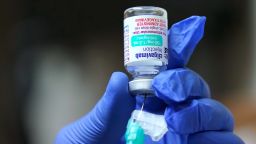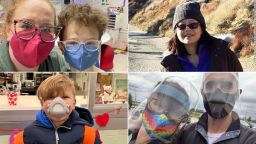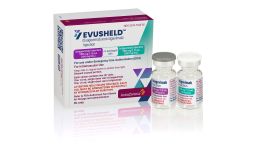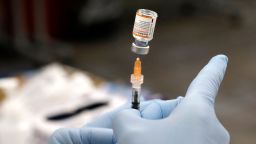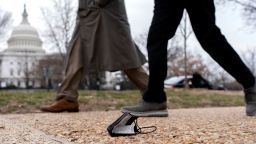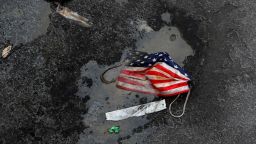Soon after the US Food and Drug Administration gave the green light to Evusheld, a new drug to prevent Covid-19, pharmacist Tom Henry alerted his blog readers. He was thrilled because finally, there was a drug that could protect people like him who are immune-compromised and had a weak response, or no response at all, to their vaccinations.
“Exciting news – FDA grants emergency use authorization [to Evusheld],” Henry wrote in a post published December 18.
A few weeks later, a reader wrote back that she’d been able to find the drug.
“Congratulations on getting this medication,” Henry responded. “I know it is in short supply.”
But Henry, a retired Air Force lieutenant colonel and a pharmacist with multiple advanced degrees, was unable to find Evusheld. He contracted the virus and died from complications of Covid-19 on February 9.
In the State of the Union address this month, President Joe Biden said that “if you’re immunocompromised or have some other vulnerability, we have treatments. … We’re leaving no one behind or ignoring anyone’s needs as we move forward.”
But a CNN investigation raises questions about the way federal and state governments have distributed Evusheld and why, more than three months into the rollout, many immune-compromised people are still having trouble getting it.
CNN’s investigation found that as the Omicron variant ripped through the United States, infecting and killing Americans, including some who might have been saved with timely access to Evusheld, thousands of boxes of the drug have been sitting on pharmacy shelves.
CNN also found that the government distributed Evusheld, a drug that was developed by AstraZeneca with the support of the US government, to unlikely places such as a spa that offers Botox and another location that does eyelash extensions.
Then, last week, the US Department of Health and Human Services removed at least dozens of locations that have Evusheld from an online locator, which means millions of immune compromised patients and their doctors can no longer find them.
“This whole thing is sad. It’s just very, very sad,” said Henry’s widow, Meli Rockhold. “It reminds me of the government response to Katrina. It’s just a cluster – I can’t say that next word.”
A leading researcher on Covid-19 and the immune-compromised emphasized that Evusheld, a monoclonal antibody, is the only prevention available for immune-compromised people – transplant patients and some cancer patients, for example, or people who take certain medications for rheumatoid arthritis and other conditions – who had a weak response to the Covid-19 vaccines.
“For people who did everything they could but didn’t have an adequate response to the vaccines, [Evusheld] is their only hope, and to deny them that because of a disorganized and chaotic distribution and education rollout is just terrible,” said Dr. Dorry Segev, a transplant surgeon and epidemiologist at NYU Langone Health.
Janet Handal, who runs an advocacy organization for people who are immune-compromised, says she hears every day from people who can’t find Evusheld.
“It’s just a tragedy that this is happening because there is such a great need for Evusheld, and there’s so many people who don’t have it,” said Handal, the founder of the Transplant Recipients and Immunocompromised Patient Advocacy Group.

The federal government distributes Evusheld and other Covid-19 medicines to states based on their population. States then distribute the drugs to various locations.
“We make these allocations to states and territories on a weekly basis, with states and territories ultimately determining how best to distribute the product within their jurisdictions,” according to a statement to CNN from an official with HHS. “We encourage jurisdictions to distribute the product in ways that ensure it reaches immunosuppressed patients such as prioritization of medical centers where these populations typically receive care.”
The head of an association of state health officials noted that state health departments are managing the distribution of five different Covid-19 drugs, including Evusheld.
“I think most state health departments do not want to be in the medical supply chain business. That’s not their core competency,” said Michael Fraser, the CEO of the Association of State and Territorial Health Officials. “It’s a complex problem, and it’s happening in real time.”
Fraser added that state health departments are looking forward to the time when the private sector starts distributing Covid-19 drugs.
‘It’s just a waste’
On March 10, Avi Patel walked out the front door of his Florida pharmacy and unexpectedly found himself in possession of 192 boxes of Evusheld.
“All of a sudden, I see [these] huge boxes arriving at my doorstep. It just popped up,” said Patel, a pharmacist who owns Lemon Bay Drugs East in Englewood, Florida.
Two weeks later, Patel hasn’t used a single one of those 192 boxes.
“It’s just a waste,” Patel said.
CNN interviews with dozens of US pharmacies reveal that Patel’s situation is not unique: Many of them have used up none or very little of the Evusheld that their state health departments sent them.
To see how much Evusheld is sitting unused on pharmacy shelves, CNN in February downloaded an HHS database of sites that have Evusheld. CNN identified 59 retail pharmacies and the number of boxes of the drug they had received. Each patient needs two boxes for a full course of treatment.
On March 16-21, CNN confirmed with 58 of those pharmacies the number of boxes they had received and how many boxes they had remaining.
In total, these 58 pharmacies have received 5,372 boxes of Evusheld from the federal government, which is enough to treat 2,686 patients. Most of the shipments were in January and February and some in March.
As of CNN’s calls last week, the pharmacies had used up 1,376 of those 5,372 boxes. That means about three-quarters of the drug the pharmacies received, or 3,996 boxes, is still unused. That’s enough to treat 1,998 patients.
Red Rock Pharmacy in Tempe, Arizona, received 480 boxes of Evusheld by early February. It has not used up a single box.
The De Queen Health and Wellness Pharmacy in De Queen, Arkansas, received 264 boxes by March 3 and has used just two of them.
Dr. Aziz Pharmacy in Indianapolis hasn’t used any of the 72 boxes they received by January 27.
Trieu Bao, pharmacist and co-founder of Soleil Pharmacy in Glen Burnie, Maryland, said he hasn’t used any of the 96 boxes that were sent to him before March 1, and they’ve asked the state to stop sending the drug because of lack of space to store it.
The issue, according to pharmacists, doctors and patient advocates, is that unlike the Covid-19 vaccines, pharmacists need a prescription before giving Evusheld, and those prescriptions have been slow in coming.
“Pharmacists aren’t allowed to administer Evusheld [without a prescription], so to send this many is ridiculous,” said Patel, the Florida pharmacist.
“Pharmacies don’t know what to do with it,” added Michael Hogue, dean of the Loma Linda University School of Pharmacy and a liaison representative from the American Pharmacists Association to the US Centers for Disease Control and Prevention’s Advisory Committee on Immunization Practices. “They’re getting Evusheld from states, but pharmacists don’t have the authority to prescribe it, so their hands are tied.”
Hogue said distributing the drug to pharmacists “really doesn’t make a whole lot of sense” and that the federal government has had “a not very well-thought-out plan on how to distribute Evusheld.”
To increase access to the drugs, patients and pharmacists have tried to educate their doctors about Evusheld.
“We’ve had people in our group call their doctor and ask about Evusheld and been told, ‘What’s that?’ ” said Handal, the founder of the advocacy group for immune-compromised patients.
“My experience is, most doctors have no clue about these treatment options,” said Harsh Patel, pharmacist and co-founder of Queens Pharmacy in Charlotte, North Carolina, which has not used any of the 24 boxes it received by late January.
Doctors don’t know about Evusheld partly because it came out at a time when there was an “avalanche” of news about other Covid-19 drugs, said Dr. William Schaffner, a liaison representative from the National Foundation for Infectious Diseases to the CDC’s vaccine advisory committee.
HHS began distributing Evusheld on December 17, and around that time, the FDA authorized a different monoclonal antibody drug that often gets confused with Evusheld, even though the other drug, bebtelovimab, treats Covid-19 and Evusheld is for prevention. Also around this time, two other monoclonal drugs were taken out of circulation, and the FDA authorized two antiviral medications.
“No one knows about Evusheld,” said Schaffner, an infectious disease specialist at Vanderbilt University Medical Center. “I think it’s very sad.”
Even if a doctor does know about Evusheld, locating it can be complicated. Some doctors’ offices have it, but most do not. Some pharmacies have it, but not large retail chains such as CVS and Walgreens, where many Americans get their prescriptions. That means doctors have to know to search for the federal government locator website that lists some – but not all – of the locations that carry it.
“There’s never been a mechanism that says ‘hear ye, hear ye, we have a new way to protect your immune-compromised patients against Covid, and here’s how you get it for your patients,’ ” Schaffner said.
If immune-compromised patients want to advocate for themselves and find a pharmacy with Evusheld, they must defy a government warning in large bold type on top of its online locator that tells patients “the therapeutics locator is intended for provider use” and that “patients should not contact locations directly unless instructed to do so by their healthcare provider.”
If a patient defies the warning and uses the locator, it’s of limited use because it’s missing at least dozens of locations that have Evusheld.
Of the 59 pharmacies with Evusheld that CNN identified on the HHS database in February, HHS removed 30 on March 16, even though all of them still had Evusheld when CNN contacted them last week. Together, these 30 pharmacies that the government removed from public view have more than 2,400 boxes of Evusheld, and now doctors and patients now have no way of finding them.
Among the pharmacies with Evusheld that HHS removed from its locator are Prescriptions Unlimited, DeliveRxd, Red Rock Pharmacy, Queens Pharmacy and Lemon Bay Drugs East, which all have Evusheld.
HHS’s response
At a March 2 meeting among HHS and state health officials, Dr. Derek Eisnor, the federal government’s lead official on allocation and distribution of Covid-19 drugs, said the “utilization rate is low” for Evusheld.
At a March 9 meeting among HHS officials and national health care and medical associations, Eisnor said the agency was “somewhat dismayed” about the low utilization numbers.
At that meeting, Cicely Waters, director of external affairs for the HHS’s Assistant Secretary for Preparedness & Response, read a question from one of the attendees.
“[Are] there any successful ways to connect prescribers to patients that want product?” Waters read. “I’ve heard of news stories about patients who want Evusheld and sites that have product, but there’s still no way to get it to those patients.” The attendee then asked HHS for its thoughts on “closing that treatment gap.”
“It’s frustrating,” Eisnor answered. “It’s really a question of what are the best mechanisms to get that patient in front of that provider and as expeditiously as possible, and so I think some of this is obviously going to depend on the location and the site or the institution.?But it is – it is frustrating.”
An HHS spokesperson told CNN that the agency has done two dozen meetings recently with states, providers and others “to not only encourage greater utilization but to do education about how the product works and who it’s for and answer questions about how best to manage supply to target those at high-risk.”
“We continue to engage provider and advocacy groups that support immunocompromised patients to help increase overall awareness and utilization of Evusheld. In addition to the dozens of engagements we’ve held with these groups, we have also created virtual resources as well as a platform for clinician peer-to-peer sharing of best practices, case studies, and administration models,” an HHS official wrote in another email.
The official said HHS removed a site from its locator if it has “less than five patient courses” of Covid-19 therapeutics. Of the 30 pharmacies that CNN found had been removed from the locator, pharmacists at 29 of them told CNN they had more than five boxes left of Evusheld. Most of them had considerably more, and several had hundreds of boxes left each.
HHS also said that “if a location goes seven days without reporting their product on hand and utilization amounts, that location is removed from the map since we cannot confirm product availability at that location.” The official added that removing “numerous” locations from the map last week “helped improve data reliability and overall product access.”
The official did not explain how removing sites from the locator that collectively have thousands of boxes of Evusheld improves product access.
“That makes no sense whatsoever,” said Handal, the founder of the advocacy group for immune-compromised people. “How could anybody even say that with a straight face?”
Evusheld sent to sites offering beauty treatments
CNN also reached out to the two locations offering beauty treatments that received Evusheld from the government.
Twenty-four boxes of Evusheld were sent to a location in Las Vegas that, in a cached version of its website, describes itself as a “premier medical spa chosen by the stars to help them look younger,” with services such as Botox and “facial rejuvenation.” CNN was unable to find a current website or contact information for anyone at this location.
Shannon Litz, a spokeswoman for the Nevada Department of Health and Human Services, told CNN that “the Nevada State Board of Pharmacy has reviewed this inquiry and determined it is in compliance, as the medication is being used by the physician in a different part of his practice.”
“We did an inquiry on it, and they’re operating within the rules of the EUA and the federal program,” said Dave Wuest, executive secretary of the Nevada State Board of Pharmacy. “There was a physician that was licensed there at the time that we sent the medicine there.”
But a Google Maps search of the address listed for the location shows an outdoor strip mall, with no indication of the business existing. Wuest said the location may have closed, and it would be up to the provider to notify the state if it had.
“Things change,” Wuest said. “I’m going to send somebody to the location and see if there’s a practitioner there.”
Twenty-four Evusheld boxes were sent to Integrative Medicine, Laser, and Aesthetics, in Carmel, Indiana, which offers, along with some health services, eyelash extensions and facial hair removal. The medicine was delivered prior to January 28, according to the HHS database.
None of those boxes has been used, according to Sarah Wygant, a medical assistant and paramedic at Integrative Medicine, Laser, and Aesthetics.
“Once the Evusheld product was offered, this provider met the necessary requirements to receive an allocation, which included having a physician providing oversight,” Megan Wade-Taxter, a spokeswoman for the Indiana Department of Health, wrote in an email CNN.
A ‘Hunger Games’-like competition for Evusheld
While many pharmacies have too much Evusheld, several medical centers say they don’t have nearly enough for their immune-compromised patients.
The Mayo Clinic in Rochester, Minnesota, has received 2,352 boxes of Evusheld, according to now removed HHS data, and the hospital has between 10,000 to 15,000 patients who could benefit, said Dr. Raymund Razonable, an infectious disease expert who heads up the hospital’s monoclonal antibody program.
To prioritize who gets the medication, Mayo has set up a tiered priority system – and the 2,352 boxes doesn’t even cover the first tier, which has 3,000 patients, he said.
“Things are tough right now. There’s not enough supply,” Razonable said.
The Moffitt Cancer Center in Tampa, Florida, has received enough Evusheld for just over 500 patients, according to spokeswoman Kim Polacek, and there are “potentially thousands” of Moffitt patients who could benefit from the drug, according to Dr. Robert Keenan, Moffitt’s chief medical officer.
“When you know there is a therapy that’s been developed but you don’t yet have the ability to give it to a patient, that’s an awful thing to have to tell the patient and an awful thing to have to deal with,” Keenan said.
CNN spoke with some medical centers that said they are not feeling strapped for Evusheld and have been able to get it to the patients who need it.
But some patients eligible for Evusheld have described a “Hunger Games”-like endeavor to find the drug.
“It’s almost like we are in a game and competing,” said Michele Nadeem-Baker, who has chronic lymphocytic leukemia and has not been able to get Evusheld from her doctors in Boston. “It’s almost Darwinian and survival of the fittest.”
Dr. Brian Koffman, a retired family doctor in Claremont, California, who has CLL, said he’s “one of the lucky ones” who’s been able to get Evusheld. He writes a blog to help other CLL patients and describes the roller coaster of emotions that many immune-compromised patients go through upon learning about Evusheld and then not being able to find it.
“There’s this light at the end of the tunnel that says ‘we have a way out’ [but then] ‘oh, sorry, you can’t get it,’ ” Koffman said.
Without protection against the virus, many immune-compromised people who did not get a full response from the vaccine and can’t find Evusheld are left to stay at home, still on lockdown after more than two years.
“We’re doing everything we can to rejoin society,” said Doreen Zetterlund of Los Angeles, who has CLL and has been trying unsuccessfully to get the drug. “[Evusheld] is the one last piece that will help us.”
Keenan, the chief medical officer at Moffitt, remembers Henry, the pharmacist who was unable to get Evusheld and died from Covid-19. Henry got care for his chronic lymphocytic leukemia at Moffitt, and he was the center’s chief pharmacy officer in 2018.
Get CNN Health's weekly newsletter
Sign up here to get The Results Are In with Dr. Sanjay Gupta every Tuesday from the CNN Health team.
Moffitt didn’t start administering Evusheld until January 24, Keenan said. That would have been too late for Henry, since by that time, he was already sick with Covid.
“Here’s Tom Henry – you couldn’t get more sophisticated about medications, [yet] he succumbs to Covid,” added Koffman, the family physician and the chief medical officer of the CLL Society. “Even when you’re [an] expert, you may not survive this.”
Now, Henry’s family – and the CLL patients he helped – wonder whether Henry might be alive today if he’d been able to get Evusheld in December, when he first excitedly told his readers about the new drug.
“Would he be alive today, doing the great work that [he’d] been doing?” said Diane Langan, a CLL patient in Syracuse, New York, who followed Henry’s blog. “It’s been very discouraging and very, very disheartening.”
CNN’s Naomi Thomas, Anokhi Saklecha, Dejania Oliver, Tasnim Ahmed, Deidre McPhillips and Brenda Goodman contributed to this report.

